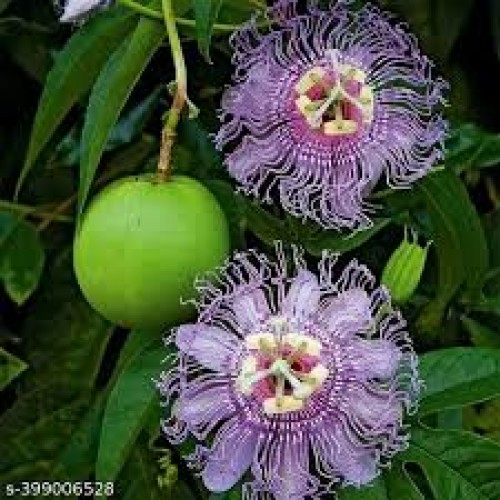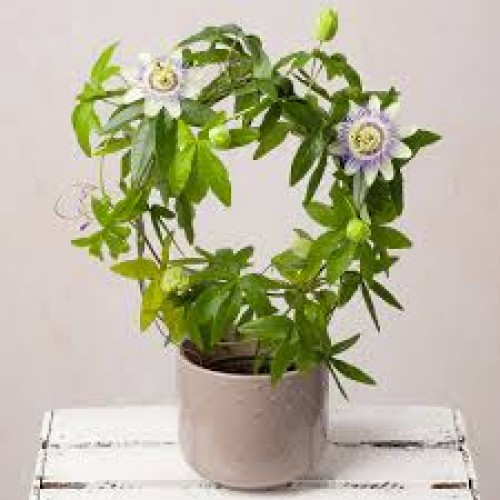off
-
Sold
-

-

out
Passion Fruit Plant: Nature, Care & Advantages
The **Passion Fruit plant** (Passiflora edulis) is a tropical and subtropical vine known for its unique fruit, vibrant flowers, and numerous health benefits. Commonly grown in regions with warm climates, passion fruit is prized for its tangy, nutrient-rich fruit, often used in drinks, desserts, and various culinary dishes.
Nature of the Passion Fruit Plant
The Passion Fruit plant is a vigorous, fast-growing vine that can climb trellises, fences, or other supports. It features large, lobed leaves and produces striking, intricate flowers with purple, blue, or white petals. The fruit is a round or oval-shaped berry that has a tough outer rind and a juicy, seed-filled interior.
Native to South America, passion fruit thrives in warm climates with moderate rainfall. The plant requires a sunny location to produce its best fruit and can be grown in both outdoor gardens and containers. It is a perennial plant, meaning it continues to grow year after year with the right care.
Care for the Passion Fruit Plant
- Climate: Passion fruit plants thrive in tropical and subtropical climates. They require temperatures between 20°C to 30°C (68°F to 86°F) to grow well. They may not survive frost or very cold temperatures, so they are best suited for warmer regions.
- Soil: The plant prefers well-drained, fertile, and slightly acidic soil with a pH between 6.0 and 7.0. Sandy loam soil with organic matter is ideal for healthy growth. Passion fruit also benefits from compost and organic mulch to retain moisture and improve soil quality.
- Watering: Passion fruit requires regular watering, especially during the growing season, to keep the soil consistently moist. However, avoid waterlogging, as excessive moisture can cause root rot. Water deeply, and allow the soil to dry slightly between waterings.
- Sunlight: Passion fruit plants require full sun to produce the best fruits. Ensure that the plant gets at least 6-8 hours of direct sunlight each day. In areas with hot summers, some afternoon shade may help prevent the plant from overheating.
- Support: Passion fruit vines are climbing plants and need support, such as a trellis, fence, or arbor, to grow effectively. Providing support helps the plant spread out and encourages healthy fruit production.
- Fertilizing: Apply a balanced fertilizer with equal parts nitrogen, phosphorus, and potassium during the growing season. Passion fruit also benefits from the addition of organic compost or slow-release fertilizer to ensure healthy growth and fruiting.
- Pruning: Regular pruning helps maintain the plant’s shape and encourages more fruit production. Remove dead, damaged, or diseased vines to keep the plant healthy. Cutting back the vines also prevents overcrowding and allows for better airflow and sunlight exposure.
- Pests and Diseases: Passion fruit plants can be susceptible to pests like aphids, scale insects, and caterpillars. Fungal diseases, such as powdery mildew and root rot, can also be a concern. Use organic insecticides like neem oil to control pests and ensure proper watering and good air circulation to prevent fungal growth.
Advantages of the Passion Fruit Plant
- Delicious and Nutritious Fruit: Passion fruit is known for its unique, sweet-tart flavor and is packed with vitamins and minerals. It is rich in Vitamin C, Vitamin A, and dietary fiber, which makes it a healthy addition to the diet.
- Antioxidant Properties: Passion fruit contains powerful antioxidants, including flavonoids and carotenoids, that help protect the body from free radicals and oxidative stress. These antioxidants may also support heart health and reduce the risk of chronic diseases.
- Digestive Health: The high fiber content in passion fruit aids in digestion and helps prevent constipation. It can also support a healthy gut microbiome and improve overall digestive function.
- Stress Reduction: The fruit contains compounds such as alkaloids and flavonoids that have been traditionally used to relieve stress and anxiety. Drinking passion fruit juice or consuming the fruit may have a calming effect on the nervous system.
- Vibrant Landscaping: As an ornamental plant, passion fruit adds beauty to gardens and landscapes. Its large, exotic flowers attract pollinators like bees and butterflies, making it a great plant for supporting biodiversity.
- Low Maintenance: Once established, passion fruit plants are relatively low maintenance, requiring minimal care to thrive. They are resistant to many pests and diseases, making them an easy plant for both beginner and experienced gardeners.
- Economic Value: Passion fruit is a valuable crop for farmers, particularly in tropical regions. It is used for fresh consumption, juice production, and even as an ingredient in various food products like jams, desserts, and beverages.
Conclusion
The **Passion Fruit plant** is an attractive, fast-growing vine that rewards gardeners with nutritious and delicious fruits. Whether you're interested in growing it for culinary uses, ornamental value, or its numerous health benefits, the passion fruit plant offers something for everyone. With proper care—such as adequate sunlight, support, and regular watering—you can enjoy a bountiful harvest of passion fruit for years to come.

